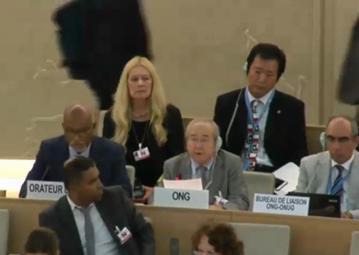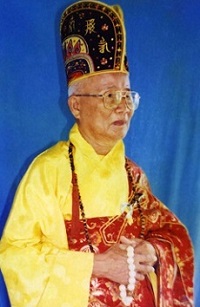GENEVA, 16 June 2017 (VCHR) – Speaking on behalf of Agir Ensemble pour les Droits de l’Homme at the UN Human Rights Council in Geneva today, Mr. Võ Văn Ái, President of the Paris-based Vietnam Committee on Human Rights (VCHR) denounced grave and consistent persecution of “non-recognised religions” in Vietnam, citing one of the most salient examples, the case of the Unified Buddhist Church of Vietnam (UBCV).
In his statement to the 35th session of the Human rights Council, which is meeting from 6-23 June in Geneva, Mr. Võ Văn Ái expressed deep concern about the situation of UBCV Patriarch Thích Quảng Độ, 89, who has been detained almost without interruption in prison, internal exile or house arrest since 1982. He also denounced continuous harassments against Lê Công Cầu, UBCV Secretary-general and leader of the Buddhist Youth Movement, who staged a one-week hunger strike in May 2017 to protest Police bans on his right to travel.
On 14 May 2017, on hearing that the UBCV Patriarch was in very bad health, Lê Công Cầu bought a plane ticket from Hue to Ho Chi Minh City, where Thích Quảng Độ is under house arrest. The next day, as he was about to leave his home, Security Police intercepted him and strictly prohibited him from leaving his home, even to buy food. Before the UN Human Rights Council, Mr. Ai called for Thích Quảng Đô’s immediate release, an end to persecution against the UBCV and the lifting of all travel bans on Lê Công Cầu.
“The plight of Thích Quảng Độ and Lê Công Cầu gives a snap-shot view of the routine challenges confronting all UBCV followers ; isolation, surveillance, bans on visits to families and friends, denial of the right to basic comfort and care, harassments and intimidation”, said Mr. Ai in the margins of the Human Rights Council. “Why does Vietnam unabatedly repress the UBCV ? Because the Communist Party tolerates no opposition. It feels threatened by a structured, popular movement such as the UBCV, with its steadfast commitment to human rights, democracy and social justice”.
Thích Quảng Độ was one of the first to speak out for religious freedom, human rights and democracy in Vietnam. The Norwegian Rafto Foundation, who awarded him their 2006 Prize for Human Rights Defenders, described him as a “unifying force” and a “symbol of the growing democracy movement in Vietnam”. He is one of the rare figures to propose a global, democratic and humanist alternative to the one-Party state imposed by the Vietnamese Communist Party (VCP). This is why the VCP has arbitrarily held him under detention for the past three decades.
Not only is Thích Quảng Độ deprived of his freedom without any justification or charge, but his living conditions at the Thanh Minh Zen Monastery in Ho Chi Minh City (Saigon) are no different from those of a prisoner. A locked, iron gate blocks the entrance to his upper-floor room. His visitors and communications are monitored and he is denied freedom of movement. After so many years of isolation and lack of adequate medical care, Thích Quảng Độ’s health has deteriorated recently. In mid-May, he fell ill and needed urgent care and medical treatment.
The authorities deliberately banned Lê Công Cầu from traveling in order to prevent him assisting Thích Quảng Độ. Exasperated by the continuous harassments, Police interrogations and travel bans over several years, Lê Công Cầu staged a hunger strike from 15 – 22 May in protest and was hospitalized as a result.
“Vietnam is cynically playing for time. They isolate UBCV leaders so that they will gradually pass away, in silence and unknown to the general public. We cannot let this happen to Thích Quảng Độ” said Võ Văn Ái. “At the same time, they seek to cut off all contacts between UBCV leaders and the population, who strongly follow the UBCV. This is why, year after year, the authorities crack-down on UBCV celebrations of important Buddhist festivals such as the Vesak (Birth of Buddha)”.
Indeed, during the Vesak celebrations in April-May 2017, security police systematically visited the homes of UBCV followers, threatening them with reprisals if they attended UBCV Vesak celebrations. They also summoned key members of the UBCV and the Buddhist Youth movement for interrogations, coercing them to renounce the UBCV and cease participation in Vesak preparations, e.g. youth leaders Ngô Đức Tiến and Nguyễn Văn Đê in Huế, and Lê Văn Thạnh and Nguyễn Anh Tuấn in Nha Trang.
In face of these grave and consistent human rights abuses, Mr. Võ Văn Ái called on the UN Human Rights Council to urge Vietnam to extend a standing invitation to the Special Rapporteurs on Human Rights Defenders, Freeedom of Opinion and Expression and Freedom of Peaceful Assembly and Association to visit Vietnam.






0 Comments
You can be the first one to leave a comment.